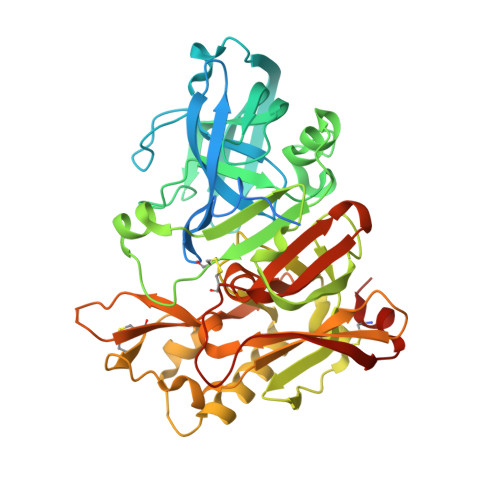Robust central reduction of amyloid-beta in humans with an orally available, non-peptidic beta-secretase inhibitor.
May, P.C., Dean, R.A., Lowe, S.L., Martenyi, F., Sheehan, S.M., Boggs, L.N., Monk, S.A., Mathes, B.M., Mergott, D.J., Watson, B.M., Stout, S.L., Timm, D.E., Smith Labell, E., Gonzales, C.R., Nakano, M., Jhee, S.S., Yen, M., Ereshefsky, L., Lindstrom, T.D., Calligaro, D.O., Cocke, P.J., Greg Hall, D., Friedrich, S., Citron, M., Audia, J.E.(2011) J Neurosci 31: 16507-16516
- PubMed: 22090477
- DOI: https://doi.org/10.1523/JNEUROSCI.3647-11.2011
- Primary Citation of Related Structures:
4YBI - PubMed Abstract:
According to the amyloid cascade hypothesis, cerebral deposition of amyloid-β peptide (Aβ) is critical for Alzheimer's disease (AD) pathogenesis. Aβ generation is initiated when β-secretase (BACE1) cleaves the amyloid precursor protein. For more than a decade, BACE1 has been a prime target for designing drugs to prevent or treat AD. However, development of such agents has turned out to be extremely challenging, with major hurdles in cell penetration, oral bioavailability/metabolic clearance, and brain access. Using a fragment-based chemistry strategy, we have generated LY2811376 [(S)-4-(2,4-difluoro-5-pyrimidin-5-yl-phenyl)-4-methyl-5,6-dihydro-4H-[1,3]thiazin-2-ylamine], the first orally available non-peptidic BACE1 inhibitor that produces profound Aβ-lowering effects in animals. The biomarker changes obtained in preclinical animal models translate into man at doses of LY2811376 that were safe and well tolerated in healthy volunteers. Prominent and long-lasting Aβ reductions in lumbar CSF were measured after oral dosing of 30 or 90 mg of LY2811376. This represents the first translation of BACE1-driven biomarker changes in CNS from preclinical animal models to man. Because of toxicology findings identified in longer-term preclinical studies, this compound is no longer progressing in clinical development. However, BACE1 remains a viable target because the adverse effects reported here were recapitulated in LY2811376-treated BACE1 KO mice and thus are unrelated to BACE1 inhibition. The magnitude and duration of central Aβ reduction obtainable with BACE1 inhibition positions this protease as a tractable small-molecule target through which to test the amyloid hypothesis in man.
- Lilly Research Laboratories, Eli Lilly & Co., Indianapolis, Indiana 46285, USA.
Organizational Affiliation:


















